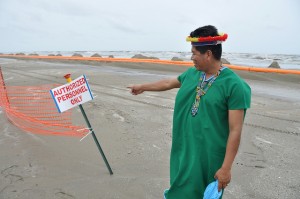
Never mind the 18 billion gallons of toxic oil waste still contaminating the Amazon rainforest, which Chevron refuses to take responsibility for. The company has promised to behave itself this time.
I say that not to make light of an obviously very serious situation, but to point out how ludicrous it is that even as we struggle to clean up the last oil spill in the Gulf of Mexico (and reports are currently circulating of yet another oil spill in the Gulf), federal regulators have seen fit to award a serial-polluter like Chevron with the first permit for a new deepwater drilling operation since BP’s Deepwater Horizon oil spill disaster.
Why is this so appalling? Mainly because Chevron has never met a community it wasn’t willing to pollute if there were profits to be made, which could be seriously bad news for the Gulf Coast residents still reeling from last year’s spill. Chevron doesn’t have the best track record when it comes to protecting the environment, and the company will do whatever it takes to avoid cleaning up its messes. Just ask the people of Ecuador, or the people of Nigeria and Kazakhstan, or even the people right here in Richmond, California — all of whom live every day with pollution from Chevron operations that the company refuses to take responsibility for.
Last year we helped organize a delegation of Ecuadorean leaders who headed to the Gulf Coast to meet with American Indian tribes and share their experiences coping with decades of Chevron’s massive oil contamination. The meetup happened as the Gulf Coast residents were bracing for the impacts of BP’s oil spill. We put out a report, “The Lasting Stain of Oil,” to distill some valuable lessons for victims of Big Oil’s reckless pursuit of profits. Perhaps now, as Chevron prepares to begin new exploratory drilling operations in the Gulf, is a good time to revisit those lessons:
-
Corporate Polluters Will Cover Up Evidence
Chevron has engaged in numerous cover-up tactics in order to minimize public awareness and try to limit future liability. -
Don’t Trust the Polluter to Properly Clean Up
Hoping to avoid a major liability, Chevron engaged in a fraudulent remediation, which consisted of covering up a small portion of its contamination, while leaving massive amounts of toxins in the environment. -
Expect a Public Relations Campaign to Gloss Over Impact and Attack Community
Like Chevron has in Ecuador, oil industry polluters often stick to the same tactics – trying to cast blame on others and distract attention from their own wrongdoing. -
Corporations Will Use Legal Maneuvering and Political Influence to Evade Liability
Rather than do the right thing and put its resources toward cleaning up its mess in Ecuador, Chevron has instead spent vast sums of money on questionable legal tactics and lobbying, and political arm-twisting. -
Oil Disasters Will Have Long-term Impacts
Much of the harm from large oil spills manifests years later, and circumstances can change dramatically over time. -
Affected Communities Have the Power to Demand Accountability
Despite Chevron’s efforts to avoid accountability in Ecuador, the communities have developed strength and resilience by uniting in their struggle for justice, health, and a clean environment.
Read all of the lessons learned over at ChevronToxico.
We sincerely hope another one of these knowledge-sharing sessions doesn’t become necessary, especially because the folks living on the Gulf Coast are only beginning to deal with the full repercussions of BP’s oil spill. But this news about Chevron getting the first post-BP oil spill permit is cause for concern, especially coupled with the fact that Chevron is planning so many deepwater drilling operations in the Gulf that the Houston Chronicle once described it as “a massive floating city about 280 miles southwest of New Orleans.”
Apparently we did not learn our lesson well enough after the BP oil spill.